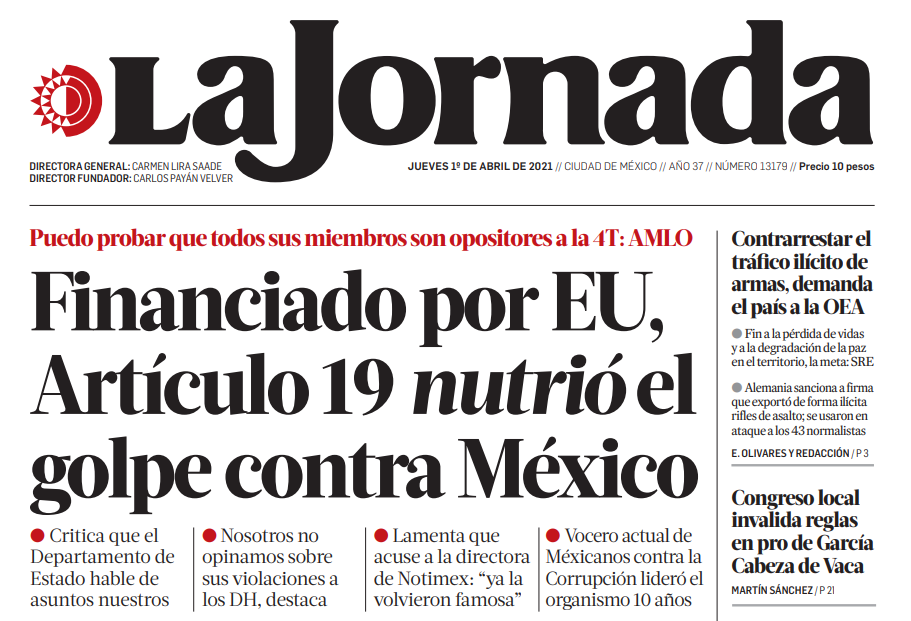The Mexican State News Agency, Notimex, has gone through nine presidential terms since its foundation in 1968. It did not survive the tenth president who had the responsibility of running it and who instead announced the agency's extinction in its 55th year of existence.
The saga that culminated in the demise of Notimex, announced in April by President Andrés Manuel López Obrador, includes accusations of mismanagement, censorship and harassment against journalists, allegedly perpetrated by the agency's director, Sanjuana Martínez, in office since 2019. It also includes a strike by the company's workers that has been going on for more than three years.They were protesting hundreds of layoffs and alleged labor abuses committed by Martínez.
The decision to liquidate Notimex is "a reflection of the current government,” Jorge Bravo, president of the Mexican Association of Right to Information (Amedi, by its Spanish acronym), told LatAm Journalism Review (LJR). Like other experts who talked to LJR, Bravo argues that while the government's neglect of public media is a constant, the López Obrador government has aggravated the situation by intensifying the use of public media for government propaganda.
"The disdain, the neglect, the little importance given to public media is not [something just] of today; it’s always been there, it’s historical. But this government did a little bit more against public media: It turned them into transmission chains of propaganda, of officialdom. It did not increase their budgets, it did not have a public policy [and] it did not modify the laws to strengthen them. In short, they did not care about public media."
The justification given by the Mexican president for the closure of Notimex is that “we no longer need a news agency in government,” as he said on April 14. “Since we took office, there’s been a labor conflict, but it’s not something we need as a government, we have our morning “mañanera,” said López Obrador. He was referring to the press conference he holds every morning, during which he often criticizes journalists who publish investigations into his government.

Notimex's director Sanjuana Martínez and Mexican president Andrés Manuel López Obrador in July 2019. (Photo credit: Presidency of Mexico)
For Bravo, "unfortunately" the president is right that the current government does not need a state news agency to communicate its actions. However, it would be a mistake to equate the role of public media with that of a president’s press conference.
“It’s one thing to have a press conference, that is, a political communication strategy, which depends on the president, on the government. And another thing is to have public media as an institution. It’s true, the press conference gives rise to stories, produces information, [and] imposes an agenda (...) But it’s not public media, it’s not an institution. Much less is it independent, plural and diverse. And it does not have a historical responsibility to become something more and better.”
Paula Saucedo, Protection and Defense Program Officer of Article 19 in Mexico, believes the Mexican government decided to liquidate Notimex due to its inability to resolve the labor conflict that arose at the beginning of 2020 and to bear the expenses accumulated by the company in recent years.
“It’s already too costly to own,” Saucedo told LJR. “It has been three years without producing news because they cannot, because they are on strike. That is the reason, in reality, why the director of Notimex did such a bad job. She spent her time attacking people, violating human rights, instead of carrying out her role as a public official (...) [López Obrador] is once again misinforming and creating narratives and stories in public opinion that are not true in order to deny the truth,” he said.
Laura Martínez Águila, a public communication specialist and audience advocate at the Mexican Radio Institute (IMER), the country's public radio channel, told LJR she found the one-sided way in which the government has been making decisions about Notimex "concerning." "The agency is not the government's and it is not López Obrador's: It is an agency of the Mexican state," she said. As such, it answers to Article 6 of the Mexican Constitution, which states that "the right to information shall be guaranteed by the State," she added.

Journalist Laura Martínez Águila: "The agency is not the government's and it is not López Obrador's." (Photo: Courtesy)
"This endless mix between public communication and government communication is what is happening with the closure of Notimex," Águila said.
Bravo also criticized the lack of transparency with the liquidation of Notimex, as since April the government has not released more information about the process.
“It’s not a process that is public. It has not been published, there is no decree, there is no agreement that says this is being done. They are doing it outside the law,” he said.
LJR contacted Mexico's Secretariat of Government asking for information on the Notimex liquidation process, but did not receive a response at the time of publication.
As a state-run news agency, Notimex's mission was to cover issues of public interest in Mexico and abroad from the point of view of the Mexican state. Many news outlets inside and outside the country published content from the agency, which had dozens of correspondents internationally and in Mexican states. It also relied on the work of journalists from its headquarters in Mexico City, the country's capital.
López Obrador, who came to power in December 2018, appointed Sanjuana Martínez, a nationally and internationally award-winning investigative journalist, as director of Notimex in March 2019. In the following months there were more than 200 layoffs at the agency, according to a report by the International Federation of Journalists (FIJ). The Unified Union of Notimex Workers (SutNotimex) claimed the dismissals were unjustified and demanded the reinstatement of workers. They went to court to get their jobs back as well as the payment of benefits owed to those who would not return. SutNotimex also reported violations of the collective bargaining agreement and requested its renegotiation.
In July 2019, Martínez justified the dismissals by claiming they corresponded to the government's austerity and budget control measures. She also said the agency was dominated by "a mafia" and by "corruption" and that, as director, she was leading a "transformation process" at the company.
A story published in November 2019 in the magazine Proceso, entitled "Caos en Notimex," reported that [Martínez's] supposed crusade against union corruption has become, according to former employees of the agency, 'labor terrorism.' [They allege that this is] due to the systematic violation of workers' rights, threats, harassment and even forced affiliation to an employer-friendly union that, in addition to the legal, administrative and informative chaos, has the Mexican state news agency in a severe crisis.”
In February 2020, 11 months after Martínez's arrival, SutNotimex began a strike, the second in the agency's history — the first, which lasted two hours, took place in 1993, according to the union. The union said the strike was due to management's refusal to engage in dialog and amidst “an environment of bullying and harassment at work undertaken by Martínez, in which workers have suffered mistreatment, gender violence and economic repercussions, as well as unjustified dismissals and defamation.”

Notimex's website has not been updated since June 2020. (Photo: Screenshot)
The day after the strike began, Notimex published a story stating that the strike had "failed" and that “the attempted work stoppage will have no effect on productivity, as the Agency will continue to work at 100%.” The agency continued to operate and the management carried out more layoffs and hiring during the period, which, according to Mexican law, is prohibited during a strike, reported the website Expansión Política.
In June 2020, already in the midst of the COVID-19 pandemic, Notimex stopped its activities by order of the agency's Governing Board, in respect of its workers' right to strike. The agency's website and social media profiles have not been updated since then.
In May 2020, a joint investigation by Article 19 in Mexico, the news outlet Aristegui Noticias and Signa_Lab, an interdisciplinary lab of the Technological and Higher Studies Institute of the West (ITESO), pointed out that Notimex management was behind “coordinated actions to harass and attack journalists and former employees they consider 'adversaries.’”
At the time, 10 people who had worked closely with Martínez reported that she and her subordinates at the agency were ordering workers around “to post messages on Twitter and use hashtags against journalists and former employees” of the company. “They also said that the director asked agency staff to use their personal profiles and create fake ones “in order to defend her management of Notimex.”
A month later, the organizations published a new story with more evidence that Martínez continued to lead waves of Twitter attacks against people who criticized her and supported the Notimex strikers. According to whistleblowers, she demanded that company workers take part in the coordinated online harassment, and retaliated against those who refused to participate, including dismissal.
Martínez was also allegedly “manipulating the Agency's editorial line, giving orders not to cover certain institutions and public officials,” the investigation sources said.

Paula Saucedo, from Article 19 in Mexico: AMLO "disinformed about our work and our resources". (Photo: Courtesy)
“The information now detailed leads to the conclusion that Notimex’s management authorized, requested, carried out acts and used material, human and financial resources to benefit directly through the defense of her person and attack on journalists, thereby restricting the exercise of their freedom of expression. The foregoing, in accordance with the General Law of Administrative Responsibilities, would imply the commission of serious misconduct such as misappropriation of resources and abuse of functions, which — if proven by the competent authorities — could constitute crimes,” wrote Article 19.
Martínez, for her part, denied the charges brought against her in the investigation. In an interview with Aristegui Noticias, she said she was the target of online attacks perpetrated by "bots and trolls every day" and repeated the accusation that SutNotimex is a "mafia" union that practices "union terrorism." She also said that some of the sources of the investigation published by Article 19 had been fired and criminally indicted for allegedly defrauding Notimex.
In March 2021, the US State Department published its annual report on human rights in Mexico, citing the complaints filed by Article 19, Aristegui Noticias and Signa Lab against Sanjuana Martínez. The López Obrador government responded by attacking Article 19, in "one of the biggest blows we've ever received as an organization," Saucedo said.
“This unleashed a series of attacks, initiated by the president of the Republic, in which he maliciously mentioned us and disinformed about our work and our resources. Even the newspaper La Jornada, which has a very large reach and is the news outlet that receives the second largest amount of official advertising funds from this administration, published on its front page that 'Article 19 receives funds from abroad to attack the government,' she said.

Detail of La Jornada's first page on April 1st, 2021. (Photo: Screenshot)
As La Jornada reported on April 1, 2021, López Obrador said at one of his press conferences that all Article 19 employees "belong to the conservative movement, which is against us." He also insinuated that the organization receives money from the United States and foreign entities to attack his government.
At the time, Article 19 responded that the Mexican president's comments “are an attempt to divert attention from its inability to combat some of the endemic human rights problems in the country, including the protection of journalists.”
According to Saucedo, no state institution has acted to investigate the complaints made by the former Notimex workers and sanction possible perpetrators. A complaint filed by Article 19 before Mexico's National Human Rights Commission (CNDH) was closed months later without being investigated. Article 19 also submitted a complaint to Notimex's audit, which in turn sent it to the Internal Control Organ of Notimex, Saucedo said. “We have been waiting for a response since 2021. And now that the agency is going to disappear, there will be no response,” she said.
Faced with the crumbling of a 55-year-old public media outlet, it is surprising that few voices have been raised in defense of Notimex. For experts consulted by LJR, the intensified use of the agency for government propaganda purposes, the administrative and labor chaos in which the company sank, and the fact that Notimex spent three years without operating — a period in which the COVID-19 pandemic broke out — contributed to its being "forgotten" by the public.
"Notimex was nullified, nobody remembered it anymore," Águila lamented. "It was not informing, providing the information the public needed. The relevance of Notimex was forgotten. So it seemed like [closure] was its expected fate after the problem with the union, which they never resolved," she said.
For Bravo, the strike by Notimex workers, while legitimate, also ended up unintentionally contributing to this outcome.

Jorge Bravo, president of Amedi: the decision to close Notimex is "a reflection of the current government.” (Photo: Courtesy)
“The problem is that journalists did not know how to defend the public service, the right to information. They preferred their labor interests, which are absolutely legitimate, but there is something more relevant, which is the right to information, the freedom of expression,” he said.
In addition, for him, the agency had also not been adapting adequately to the changes that journalism has been going through in recent years, both in its modes of production and in its modes of distribution and consumption.
“News agencies are not as important as they were in the 20th century,” Bravo said. “The role a news agency should have has been attenuated by reality itself, by a plurality and diversity that have not been incorporated by the public media, including the news agency. It is being surpassed because that plurality and diversity exist in reality, in social networks, [and] on the Internet. There are more independent news outlets, there’s more competition. They’ve not been able to rescue the values and principles that would really make them fundamental public media,” he said.
In this sense, Águila stressed the importance of differentiating between a State vision of communication, which should serve the public interest, and a government vision, which tends to prioritize propaganda.
"These are two different things, which in the Notimex situation were not perceived. It was not a newspaper, a radio or a TV channel. It was a source of information for the population and for other media. To think that this has been discarded and disappeared just because the president has a slot every morning is not to understand the scope and power of information. And for our Latin American democracies, differentiating the role of the state from the role of the government is fundamental to avoiding the concentration of power," she said.
Saucedo stressed that the closure of Notimex, while not as serious as the lethal violence against journalists in the country, adds on to other aspects in the political and informational landscape in Mexico to aggravate the situation of press freedom and freedom of expression in the country.
“The absence of Notimex combines with violence against the press, with the siege against the press, with the precariousness of the press, and adds to an already very hostile environment for the press to carry out its work and for citizens to have information of public interest. So it is very serious that this news agency no longer exists, and the reasons why the news agency ceased to exist are much more serious,” she said.
LJR attempted to contact the government of Mexico and SutNotimex, but did not hear back at the time of publication.